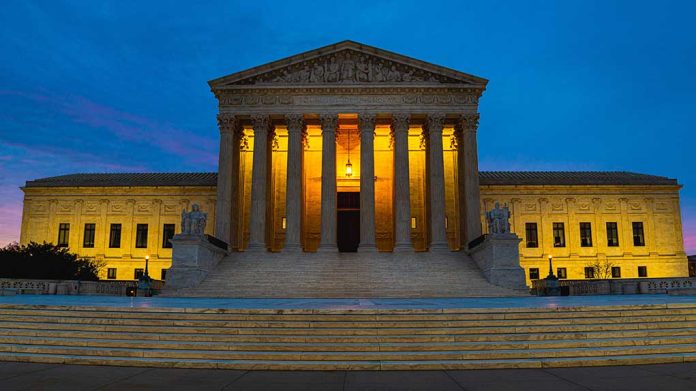🔴 Website 👉 https://u-s-news.com/
Telegram 👉 https://t.me/usnewscom_channel
The Supreme Court’s 5-4 ruling gives illegal immigrants extra time to appeal deportation orders when deadlines fall on weekends, effectively extending their stay despite clear legal cutoffs.
At a Glance
- Supreme Court ruled 5-4 that illegal immigrants get extra time for appeals when deadlines fall on weekends or holidays
- Justice Neil Gorsuch authored the majority opinion, joined by Roberts, Sotomayor, Kagan, and Jackson
- Justices Thomas, Alito, Kavanaugh, and Barrett dissented, arguing deadlines should be strictly enforced
- The case involved a Mexican citizen who missed his 60-day voluntary departure deadline because it fell on a weekend
- Decision aligns with the Ninth Circuit’s practice but reverses the Tenth Circuit’s stricter interpretation
Deportation Deadlines Now Have Flexible Timelines
In a decision that weakens enforcement of immigration law, the Supreme Court has ruled that illegal immigrants facing deportation can have extra time to appeal removal orders when deadlines fall on weekends or holidays. The 5-4 ruling in Monsalvo Velazquez v. Bondi effectively extends the stay of illegal immigrants in the United States despite clear statutory deadlines. This ruling follows the ongoing pattern of procedural obstacles being placed in the way of effective immigration enforcement.
“Here, as elsewhere, the term ‘days’ operates to extend a deadline that falls on a weekend or legal holiday to the next business day.” Justice Neil M. Gorsuch
The Case That Created the Loophole
The case centered around Hugo Abisai Monsalvo Velazquez, a Mexican citizen who entered the United States illegally in 2004 and faced removal proceedings beginning in 2011. After seeking relief under the U.N. Convention Against Torture, Velazquez was granted voluntary departure by an immigration court. The court established a 60-day deadline for his self-deportation, but when that deadline fell on a weekend, Velazquez filed his challenge on day 62, claiming the weekend shouldn’t count.
The Board of Immigration Appeals rejected his appeal, and the U.S. Court of Appeals for the 10th Circuit upheld this decision, finding that he had missed the clear statutory deadline. However, the Supreme Court’s new ruling overturns this common-sense interpretation, sending the case back to the 10th Circuit for reconsideration under the new, more lenient standard that now extends deadlines to the next business day if they fall on a weekend or holiday.
Conservative Justices Push Back
The conservative wing of the Court strongly dissented from this decision. Justice Samuel Alito, joined by Justices Thomas, Kavanaugh, and Barrett, pointed out the obvious: deportation deadlines should mean what they say, regardless of what day of the week they fall on. Their dissent highlights how this ruling creates yet another opportunity for illegal immigrants to extend their unauthorized stay in the country by exploiting procedural technicalities rather than complying with lawful orders.
“Saturday is a day of the week, and there is no reason why petitioner could not have left the country on or before that date.” Justice Samuel A. Alito Jr.
Alito further emphasized the practical reality that Velazquez had multiple options to comply with his departure deadline: “Petitioner gives us no reason to believe — and I am aware of none — that the roads to Mexico, his home country, were closed; so he could have driven or taken a bus across the border. He also could have flown to Mexico or any other country that would admit him.” Justice Samuel A. Alito Jr.
More Delays in an Already Broken System
This ruling effectively creates another loophole in our immigration system that’s already struggling with a backlog of millions of cases. Justice Gorsuch noted that administrations since the Clinton era have accepted a more lenient interpretation of deadlines, continuing a troubling pattern of weakening immigration enforcement through procedural technicalities. Meanwhile, the dissenters correctly argued that the courts lacked jurisdiction to even hear this challenge, as it was a procedural issue, not a final order of removal.
For Velazquez, who faced a 10-year bar from returning to the U.S. if formally removed, this ruling provides an unfair advantage simply because his deadline happened to fall on a weekend. The court’s decision now adds to the already overwhelming complexity of immigration enforcement, further empowering those who enter our country illegally to exploit technicalities in order to remain here against the clear intent of our laws. This is precisely the kind of judicial overreach that continues to undermine efforts to restore order to our southern border.

